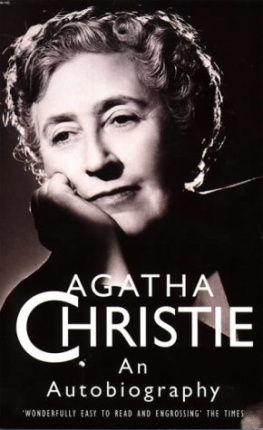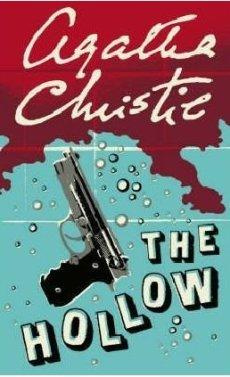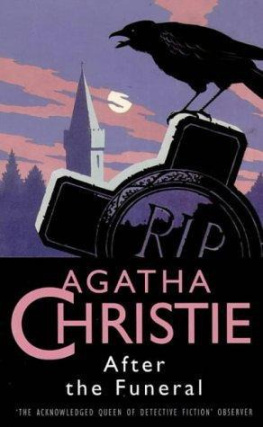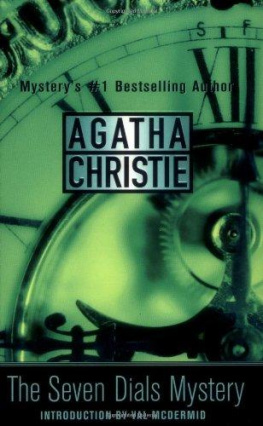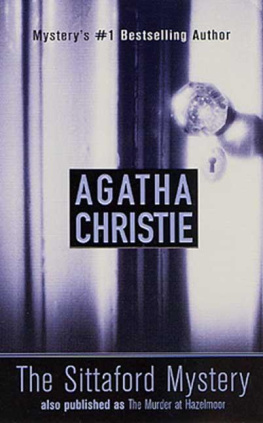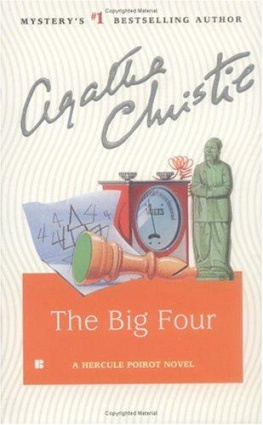Lucy Worsley - Agatha Christie: An Elusive Woman
Here you can read online Lucy Worsley - Agatha Christie: An Elusive Woman full text of the book (entire story) in english for free. Download pdf and epub, get meaning, cover and reviews about this ebook. year: 2022, genre: Non-fiction. Description of the work, (preface) as well as reviews are available. Best literature library LitArk.com created for fans of good reading and offers a wide selection of genres:
Romance novel
Science fiction
Adventure
Detective
Science
History
Home and family
Prose
Art
Politics
Computer
Non-fiction
Religion
Business
Children
Humor
Choose a favorite category and find really read worthwhile books. Enjoy immersion in the world of imagination, feel the emotions of the characters or learn something new for yourself, make an fascinating discovery.
- Book:Agatha Christie: An Elusive Woman
- Author:
- Genre:
- Year:2022
- Rating:3 / 5
- Favourites:Add to favourites
- Your mark:
- 60
- 1
- 2
- 3
- 4
- 5
Agatha Christie: An Elusive Woman: summary, description and annotation
We offer to read an annotation, description, summary or preface (depends on what the author of the book "Agatha Christie: An Elusive Woman" wrote himself). If you haven't found the necessary information about the book — write in the comments, we will try to find it.
Agatha Christie: An Elusive Woman — read online for free the complete book (whole text) full work
Below is the text of the book, divided by pages. System saving the place of the last page read, allows you to conveniently read the book "Agatha Christie: An Elusive Woman" online for free, without having to search again every time where you left off. Put a bookmark, and you can go to the page where you finished reading at any time.
Font size:
Interval:
Bookmark:
Preface: Hiding in Plain Sight
A gatha Christie was sitting quietly on the train when she overheard a stranger saying her name.
In the same carriage, she said, were two women discussing me, both with copies of my paperback editions on their knees. The ladies had no idea of the identity of their matronly, middle-aged fellow passenger, and proceeded to discuss the most famous author in the world. I hear, said one of the ladies, she drinks like a fish.
I love this story because it sums up so much about Agatha Christies life.
Firstly, she told the anecdote in an interview published to celebrate her eightieth birthday in 1970. What a long and tumultuous life shed had!
She was born into a luxurious, late-Victorian world: her family had inherited wealth, a house with a ballroom, and domestic staff galore. All this would be lost, leaving Agatha to earn her own living. Her eight decades also took her through two world wars, the decline of the British Empire, and nearly a century of violent social change. Shed chart all this in her eighty books. Theyre not just addictive entertainment, theyre also a marvellous resource for the historian.
Secondly, theres the fact that both ladies on the train had Agatha Christie paperbacks. Of course they did. She was simply ubiquitous, especially in the post-war period when a Christie for Christmas became an annual ritual. Christie is the best-selling author after Shakespeare and the Bible, so the clich runs. What interests me, though, is the fact that not only does she hold that position, but holds it as a woman . And she wasnt just a novelist, either, she also remains historys most-performed female playwright. She was so successful people think of her as an institution, not as a breaker of new ground. But she was both.
Thirdly, the misconceptions. There are so many of them! To go back to the ladies on the train: far from drinking like a fish, Agatha was in fact teetotal. She didnt enjoy wine, and her favourite drink was a glass of neat cream. But the ladies assumed the writer must be addicted, damaged, unhappy.
And then, in the railway carriage, theres also the watchful presence of Agatha herself. Present but unnoticed, she was using life for her art. This particular incident, a novelist overhearing herself described as a drinker, made its way into Agathas novel Dead Mans Folly when it happens to her fictional alter ego, the detective novelist Mrs Ariadne Oliver.
The scene also contains an essential truth about Agatha Christie as a person. Yes, she was easy to overlook, as is the case with nearly any woman past middle age. But Agatha deliberately played upon the fact that she seemed so ordinary. It was a public image she carefully crafted to conceal her real self.
If the two ladies on the train had asked her name, she wouldnt even have said Agatha Christie. Shed have answered to Mrs Mallowan, the name shed taken from the archaeologist, fourteen years younger than herself, to whom shed made an impetuous marriage.
If asked her profession, shed have said she had none. When an official form required her to put down what she did, the woman whos estimated to have sold two billion copies always wrote housewife. And despite her gigantic success, she retained her perspective as an outsider and onlooker. She sidestepped a world that tried to define her.
In this book, Id like to explore why Agatha Christie spent her life pretending to be ordinary, when in fact she was breaking boundaries. Nobody in the world, she once said, was more inadequate to act the heroine than I was. Her view was partly her own extreme modesty. But it also had much to do with the world into which she was born, with its imperatives about what women could and couldnt do. This is a biography with a historical bent, the life of a woman whose story intertwines with that of the twentieth century.
When I told people I was writing about Agatha Christie, their first questions were often about the eleven dramatic days in 1926 when she disappeared, causing a nationwide hunt for her corpse. Its often been claimed she went into hiding in order to frame her husband for her murder. Was this true?
Its frequently said that Agatha remained silent about this notorious incident for the rest of her life. But thats incorrect. Ive pieced together the surprising number of statements she did in fact make about it. And looking at them carefully, I believe much of the so-called mystery melts away.
Agatha shattered the twentieth centurys rules for women. Females of her generation and social class were supposed to be slender, earn nothing, blindly adore their numerous children and constantly give themselves to others.
The only one of these Agatha completely fulfilled is the last. She did give the best of herself her industry, her creativity, her occasional genius to her readers. No wonder they still love her for it.
These days we dont need to put women on pedestals. And that means we have to face the fact that somewhere in the mass of contradictions making up Agatha Christie was a very dark heart. Its not just that she could dream up stories in which even children can kill. Its also that her work contains views on race and class that are unacceptable today.
But that doesnt mean we should tut-tut and look away. This matters, because Agatha Christies writing has become a sort of shorthand for a typically English view of the world. The prejudices of her class and time, often revealed in her fiction, are part of the history of twentieth-century Britain.
And despite the surface conservativism of her work, I also believe that Agatha was quietly changing her readers perceptions of the world in a positive way. Her stories show that a short, effeminate foreigner with a funny name can beat evil, using brains not brawn. That even a fluttery old lady can bring nemesis to the wrongdoer. And that childless singletons both Hercule Poirot and Miss Marple are unmarried dont need a conventional family round them to thrive.
Finally, I want to make it clear that Christie to her first readers wasnt nostalgic or anything to do with heritage. In my childhood, I used to watch cosy, cleaned-up versions of her stories on television. But the original novels were a product of a twentieth century that had broken with the past. Christie herself lived a modern life: she went surfing in Hawaii; she loved fast cars; she was intrigued by the new science of psychology. And when her novels were published, they were thrillingly, scintillatingly modern too.
In this book were going to meet one of the great writers of the twentieth century, someone whos constantly disparaged and consistently misunderstood, whose towering achievements are almost hidden in plain sight.
But first lets go back to the beginning, to meet a little girl with flaxen hair.
 PART ONE
PART ONE 
Victorian Girl 1890s

The House Where I Was Born
A gatha Miller grew up in a special place. Her childhood home stood on a hill above the seaside resort of Torquay in the south of Devon.
Ashfield, as the house was called, was a substantial Victorian villa set in a garden full of numerous, numinous trees. Agatha loved these great trees of the earliest garden she could remember: the big beech-tree, the Wellingtonia, the pines, the elms and the green grass fairy ring by a monkey puzzle where she played with her hoop.
Next pageFont size:
Interval:
Bookmark:
Similar books «Agatha Christie: An Elusive Woman»
Look at similar books to Agatha Christie: An Elusive Woman. We have selected literature similar in name and meaning in the hope of providing readers with more options to find new, interesting, not yet read works.
Discussion, reviews of the book Agatha Christie: An Elusive Woman and just readers' own opinions. Leave your comments, write what you think about the work, its meaning or the main characters. Specify what exactly you liked and what you didn't like, and why you think so.


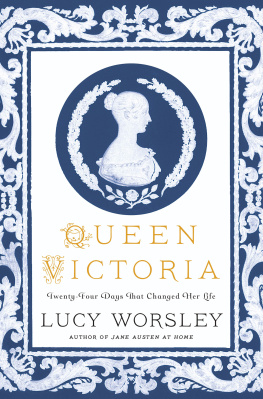
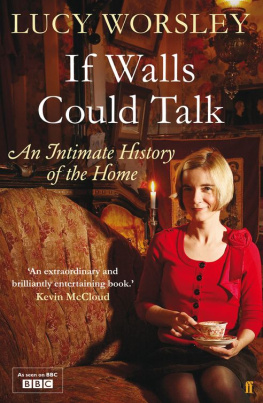
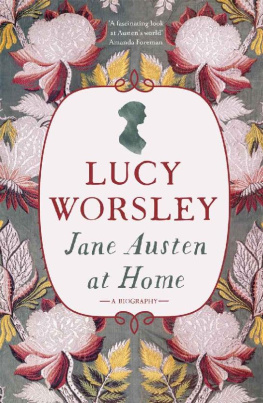
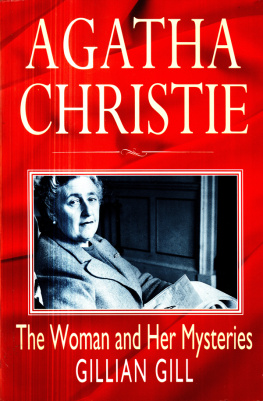
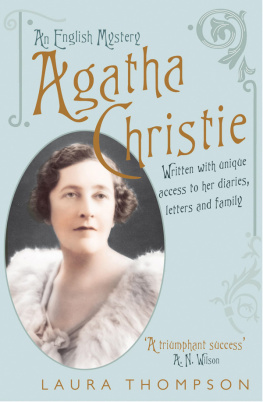
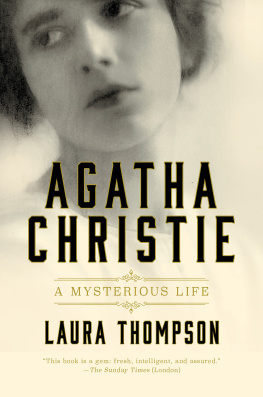

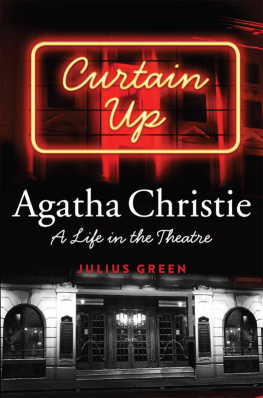
![Agatha Christie [Agatha Christie] - Problem at Pollensa Bay](/uploads/posts/book/140367/thumbs/agatha-christie-agatha-christie-problem-at.jpg)
